A Tibetan-Canadian student was attacked online after winning student council elections. She thinks Beijing is to blame.
 Image from Chemi Lhamo Instagram via The Stand News.
Image from Chemi Lhamo Instagram via The Stand News.
Lhamo's personal social account was flooded with demeaning comments and veiled threats of violence from overseas students who appeared to be from mainland China. As her story began to make headlines in international media outlets, students from Hong Kong and Taiwan fired back in defense Lhamo's defense.
In a phone interview with Stand News, Chemi Lhamo said she believed that the incident was mobilized by organizations associated with Chinese government, an accusation that Chinese officials have denied.
Before this election, I had already been elected as vice-president of the student council for eight whole months and nothing ever happened. However, after all these sudden events, you cannot help but think that there is an organization manipulating these events behind the scenes. It’s really funny how I’ve been serving as a vice-president for so long, how I’ve organized many events and never held back from expressing my ideals, but nobody has ever asked me about my political opinions.
She also said that her fellow students from mainland China began to behave strangely. One of Lhamo’s classmates from mainland China spontaneously asked her, via mobile message, to draft a statement regarding Tibetan independence. She also received phone calls playing “red songs” (propaganda songs praising the Chinese Communist Party). Lhamo could not understand these songs, as she does not speak Mandarin Chinese.
Alongside the joint attacks and the comments on the internet, a group of students went to the student council office to demand that the election results be reconsidered. The campus student council has now temporarily closed its conference room, for safety reasons.
Chemi Lhamo has been a student activist for some years. She is an active member of the Tibetan community in Toronto and once joined a protest outside the university's Confucius Institute, the local branch of a global network of Chinese cultural institutions that are sponsored by the Chinese government and intended to promote China's soft power overseas. In recent years, she has also exchanged views with social activists from Hong Kong and Taiwan on topics related to freedom of speech, self-determination, democracy and related topics at public events.
Lhamo has never been afraid to speak up or show her Tibetan identity – she wears a Chuba, the traditional Tibetan dress, every Wednesday. Until the election, she had never perceived any animosity from her Chinese classmates. This is what led her to worry that this barrage of harassment was instigated by Chinese authorities.
From stateless refugee to student council president
Before immigrating to Canada at 11 years of age, Chemi Lhamo was a stateless refugee residing in India. Her grandparents were forced into exile along with the Dalai Lama in 1959. Within these rigid borders, no matter where she and her family went, they were looked down upon.
Every time someone asks me: ‘Where are you from?’ I always end up struggling to answer – I sometimes say that I’m from India, but I was denied citizenship status there; sometimes I say that I’m from Tibet, but when they ask me how Tibet is like, I really don’t know how to answer, because the Chinese embassy won’t even issue me a visa to go to Tibet. But it’s this experience of being viewed as an outsider that has made me understand my people’s culture better: the Tibetan culture.
Lhamo recounted that when she had just immigrated to Canada, a new kid from Tibet unexpectedly came to class. She was excited and happy to have found someone from her own land to become friends with, and she knew that he could speak the Tibetan language. However, frowning at her, he told her: “How about we don’t speak Tibetan? I can speak English.”
I don’t know if he was either ashamed or had some kind of guilt. I really don’t know. But it was then when I realized that some young Tibetans don’t want to speak their own language as if they were being pressured to speak another language.
At the time, Lhamo was only 12 years old. Feeling insecure about her identity, she convinced her parents to move back to a neighborhood with a Tibetan community. From then on, she learned more about Tibetan language, culture and Buddhism and became an activist.
Tibetan values, such as be considerate, be respectful to the elderly, ignorance as the root for negativity and etc., has give me a lot of strength. And the more I understand my culture, the more confident I feel.
This strength and confidence, she says, has enabled her to speak up as an immigrant and a Tibetan:
Being an immigrant is very difficult, but this struggle is what makes me who I am. Today, I speak about the Tibetan people loud and clear with pride thanks to the strength that my identity as a Tibetan gives me.During the student council election, I often emphasize the need for the marginalized to have their own representation during the student council elections. We need representation so that our rights be upheld.
Suffering will end
For Lhamo, the ideal world is one without borders or boundaries — Tibetan independence and autonomy is not the real issue at stake.
My vision for Tibet is the same vision that I have for the whole world: I wish for Tibetan people to enjoy the same rights as Canadians, namely freedom to express themselves, freedom of belief, freedom to avoid political oppression.I don’t only wish for Tibetan people to enjoy these rights, I also wish that people from Hong Kong and Taiwan, Eastern Turks, the 60 million refugees around the world and for everyone to enjoy these rights.
Many people in Hong Kong believe that China has become more authoritarian in recent years, adopting a more heavy-handed policy towards political dissidents and ethnic minorities. Even in Hong Kong, the space for freedom of speech and association has diminished.
Chemi Lhamo is familiar with the political challenges faced in Hong Kong after the 2014 Umbrella movement but she shared her optimism with Hong Kong people and urged them not to give up.
........................................................................................
The month of February brought the entire Tibetan world on social media, basking in the victory of a young Tibetan woman who rose to become the President of the University of Toronto’s Scarborough Student’s Union.
A spirited activist, youngest board member of the Tibetan Association of Ontario as well as the co-founder of the Tibetan Youth Alliance Committee, Chemi Lhamo has donned multiple roles and responsibilities to serve the Tibetan cause.
Immediately after her election to President of UTSSU was made public, an online hate campaign led by groups of Chinese students attending the University was leveled against her.
The University of Toronto hosts one of the largest bodies of overseas Chinese students in the world, with 12,000 Chinese nationals currently choosing to study there. The Chinese student’s groups reportedly with links to the Confucius Institute took to social media petitioning to overturn the election.
In face of vicious trolls and hate messages, Chemi persevered. A Tibetan Buddhist, a stateless refugee and a Neuroscience and Psychology student at the University of Toronto, Chemi said the trying times were an opportunity to put the values of love and compassion with which she was raised into practice.
The episode gained steam in mainstream media: Epoch Times, CBC News, BBC Chinese, Taiwan News, Voice of America, RFA Cantonese, Voice of Tibet, News.v.daum.net, Reddit, VOA Chinese, National Post, and RFA Tibetan among others. In the period of fewer than two weeks, Chemi’s Instagram profile gained over 6600 followers.
Here are the segments of my interview with Chemi Lhamo.
On your nomination in the presidential election of the University.
Chemi Lhamo: Due to my involvement in the Tibetan community from TCCC, CTAO to SFT, I was eager to bring my experience and skill sets to my campus, the UofT Scarborough community. I was first hired as the Racialized Students’ Collective, whereas part-time staff, I lead a team consisting of up to 15 volunteers throughout the school year and hosted at least one event per month tackling systemic barriers such as Racism, Anti-Blackness, Anti-Indigeneity, and Islamophobia.
Through this experience and my upbringing as a Tibetan, I realized the importance of representation and what it meant to be sitting on the table to be the voice for the often, unheard.
This experience encouraged me to run for the Vice President-Equity role, I work full time on ensuring that the union operates from an anti-oppressive framework to build an equitable campus.
I had the opportunity of working with various marginalized communities, which further strengthened my passion for service. As my term comes to an end, my peers encouraged me to run for Presidency and to be quite frank, I really didn’t want to at first. After putting much thought behind my intention and motivation, I worked with my team to develop a vision for my school. Nominations began on January 7, followed by two weeks of campaigning period and 3 voting days.
How do you plan to lead forward?
Chemi Lhamo: My priority is the Students’ voice and uniting my campus via a revived campus life and meaningful dialogue. In addition to delivering my campaign points, I want to be there for my team to make sure they are supported with their projects.
This achievement is just the beginning, the work has just begun. The provincial government has attacked our students and their unions, it’s time for us to unite, organize, and fight back the attack.
I’m looking forward to applying the wisdom from my rich Tibetan traditions to learning, unlearning, decolonizing and growing.
As the Student’s Union President, what does your role entail?
Chemi Lhamo: I shall serve as the Chief Executive Officer of the Union and all its subsidiaries, as defined in the Act; serve as the official representative and spokesperson of the Union; act on behalf of the Board of Directors and the Executive Committee between meetings, and where action is immediately necessary, participate as a voting member of the Board of Directors, Executive Committee, Finance Committee, Policy & By-Laws Committee, Clubs Committee, Campaigns & Equity Commission, Events Commission; chair the Policy & By-Laws Committee and the Full-Time Staff Hiring Committee; supervise the Executive Director; responsible for the general management and supervision of the affairs and operations of the Union; responsible for developing a media protocol in cooperation with the Executive Committee and ensuring that this media protocol is implemented.
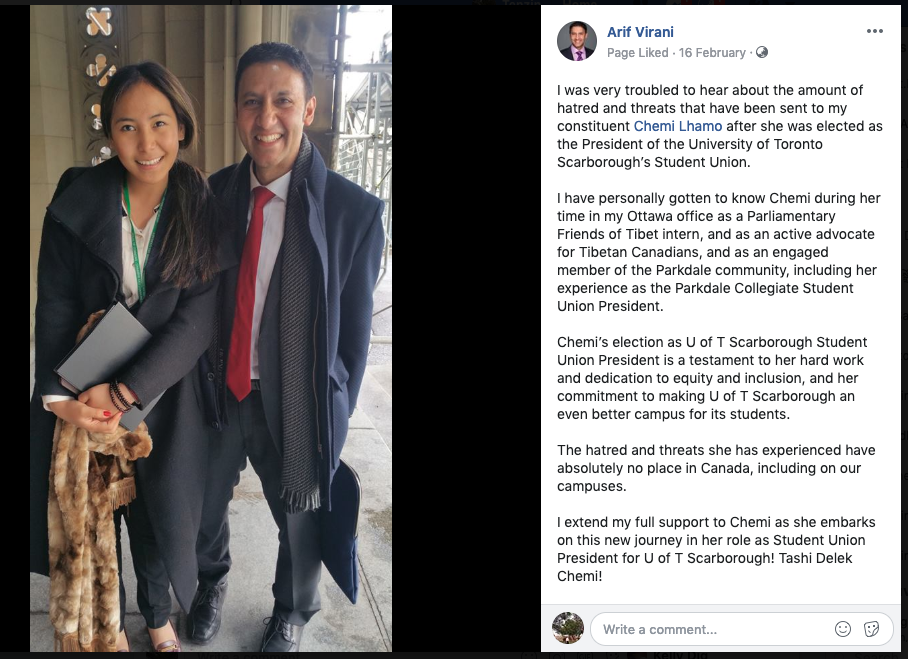
MP Arif Virani, Chair of Parliamentary Friends of Tibet (PFT) shared a post on his Facebook handle extending his full support for Chemi Lhamo.
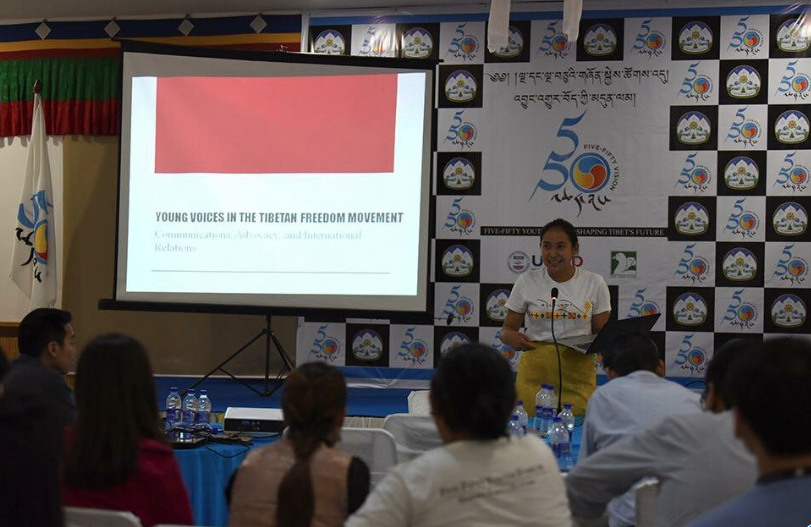
Chemi Lhamo during her participation in the Five Fifty Youth Forum organised by the Central Tibetan Administration in August 2018.
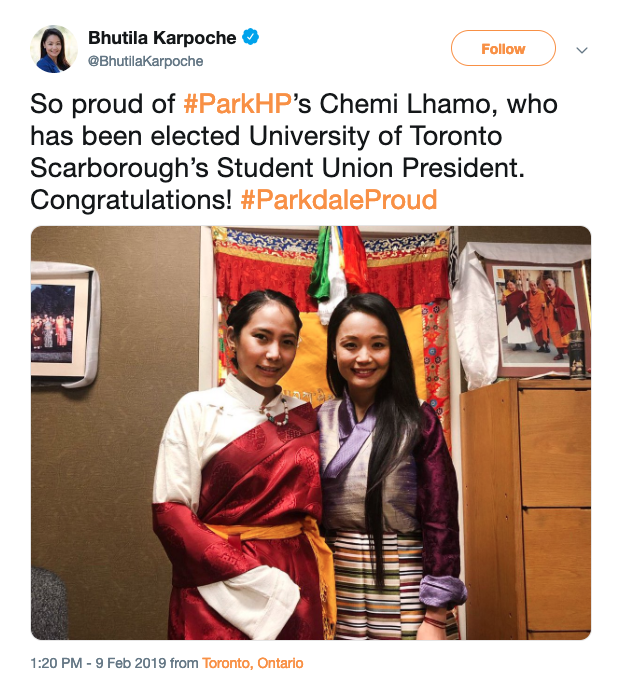
Bhutila Karpoche, Member of Provincial Parliament for Parkdale—High Park, Canada states her support for Chemi Lhamo in a tweet.

Chemi Lhamo leading a protest rally, Toronto, Canada.
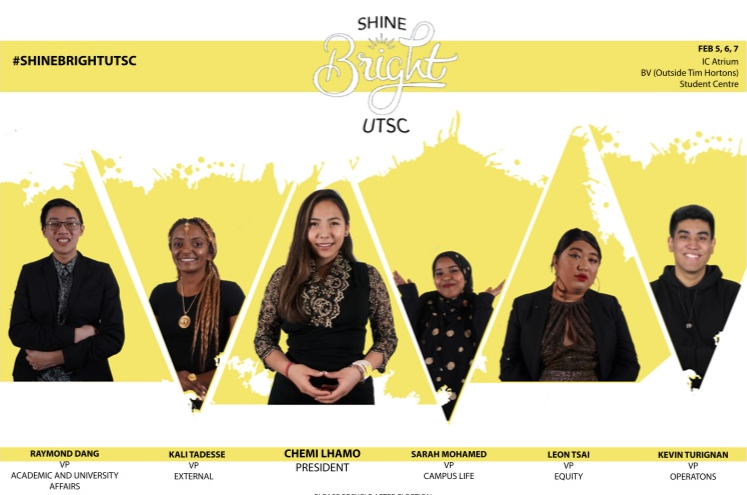
Starting 1 May, Chemi Lhamo will serve as the President of the University of Toronto Scarborough Student’s Union.
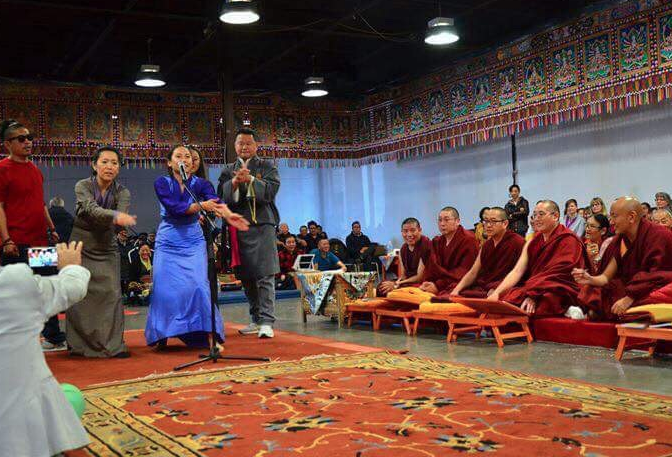
Chemi Lhamo taking part in a traditional Tibetan dialectical debate presentation.
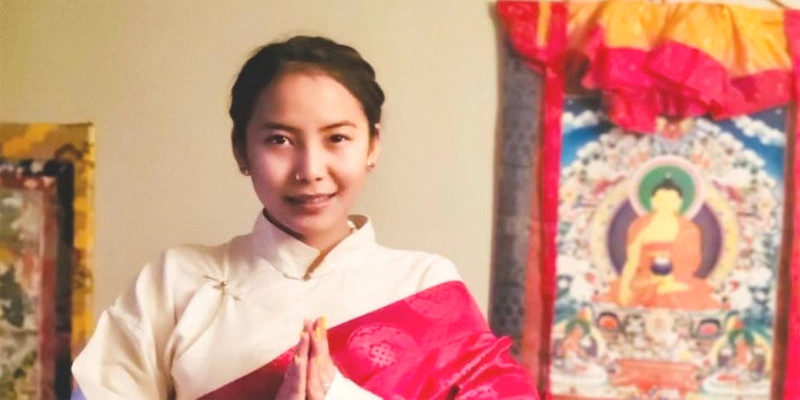
No comments:
Post a Comment
Comments always welcome!